Derek Trucks on tone secrets, first records and keeping it real
The Southern slide maestro can't get no satisfaction
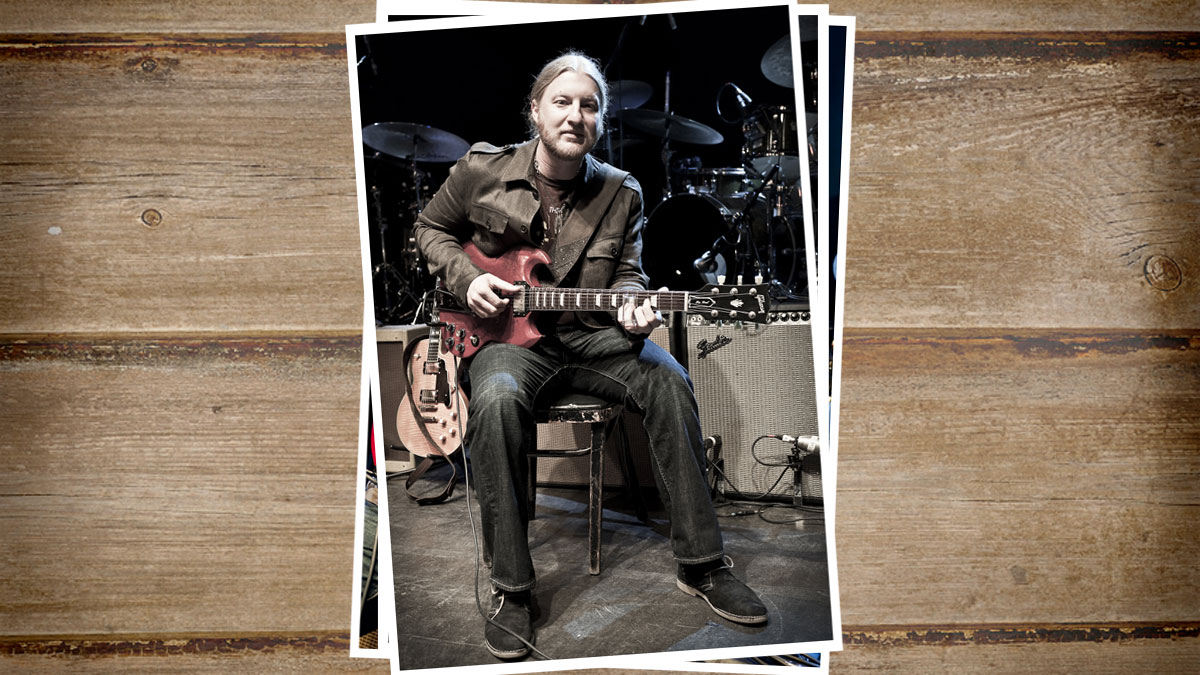
Introduction
The Southern slide maestro tells us why gear doesn’t make a player, why mediocre guitarists should pipe down, and why he’ll never be satisfied...
The first time the wider world became aware of the Derek Trucks phenomenon was a piece on American TV news in the early 1990s. The duckling-blond kid in the baseball cap might have been swamped by his instrument, yet his touch and feel were sufficiently dazzling to make fellow slide guitar maestro Sonny Landreth snap to attention.
"Any sense of Southern rock nepotism evaporated as he ascended through the ranks on his own merits"
“I saw this clip on the news, this little kid playing slide,” Landreth later remembered. “Me and my bass player, we just looked at each other and said, ‘Yep, that kid’s got it...’”
Landreth’s prediction was right on the money. Born in Jacksonville, Florida, in 1979, the precocious slide man might have been the nephew of Allman Brothers drummer Butch Trucks, but any sense of Southern rock nepotism evaporated as he ascended through the ranks on his own merits.
By the late 90s, Trucks was juggling his Grammy Award-winning solo band with stints as the planet’s most celebrated sideman, sprinkling bottleneck fairy dust over the oeuvre of everyone from the Allmans to Eric Clapton.
Yet for many, his greatest creative outlet came in 2010, when he joined forces with wife Susan Tedeschi to form the genre-blurring Tedeschi Trucks Band. “When this band is firing on all cylinders,” he tells us, “it’s hard to beat.”
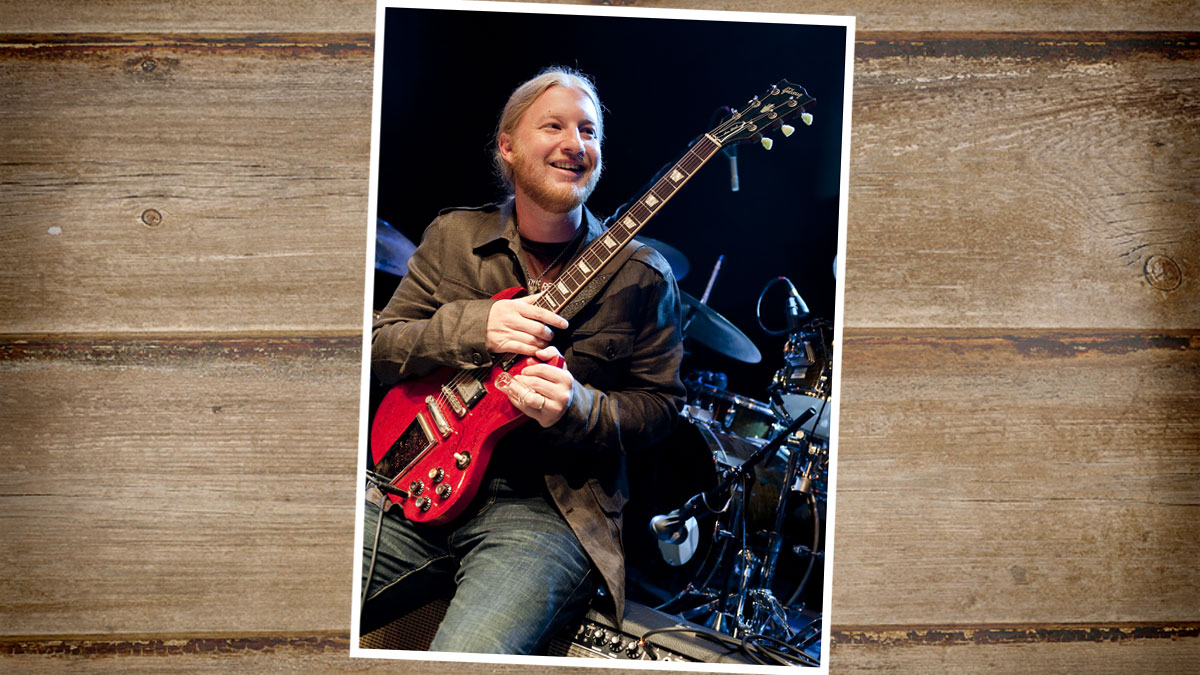
Never forget your first records
“For me, it was At Fillmore East, the Layla record [Layla And Other Assorted Love Songs], The Best Of Elmore James, and then BB King’s Live In Cook County Jail. That’s what really got me, and you can still hear those influences in my playing today, without a doubt.
"I would often go back and listen to those early recordings, or bootlegs of Duane, just to reconnect with what that music was all about"
“I go back to them from time to time, and you kinda drink from the well again, and you reconnect. Y’know, playing in The Allman Brothers for 15 years, I would often go back and listen to those early recordings, or bootlegs of Duane, just to reconnect with what that music was all about. It’s good to go back to your influences.
“I mean, it’s good to get away from them, too. You don’t want to lean too much on one thing, but I feel like anything that moves you, that keeps that flame lit, can’t be a bad thing.”
Be your own worst critic
“I don’t often sit back and listen to my playing, but when I do, I find plenty to tweak. I feel that way about the band and everything else. After every show, you’re kinda picking it apart and thinking about what can be better. It’s very much a work in progress that way. There’s not a lot of backslapping going on.
“It’s funny - sometimes I hear the really early stuff, like, from when I was 13, and there’s something about the freedom and the unhinged nature that I enjoy. Then there’s certain things I’ll hear myself do where I’ll think, ‘Wow, I haven’t changed a bit - I’m doing that same shit now!’
“When I listen back, I can tell the things that I fall back on. I can tell the things that are clichés in my playing. But I think I heard more of it early on. Y’know, you start weeding that stuff out as you go.”
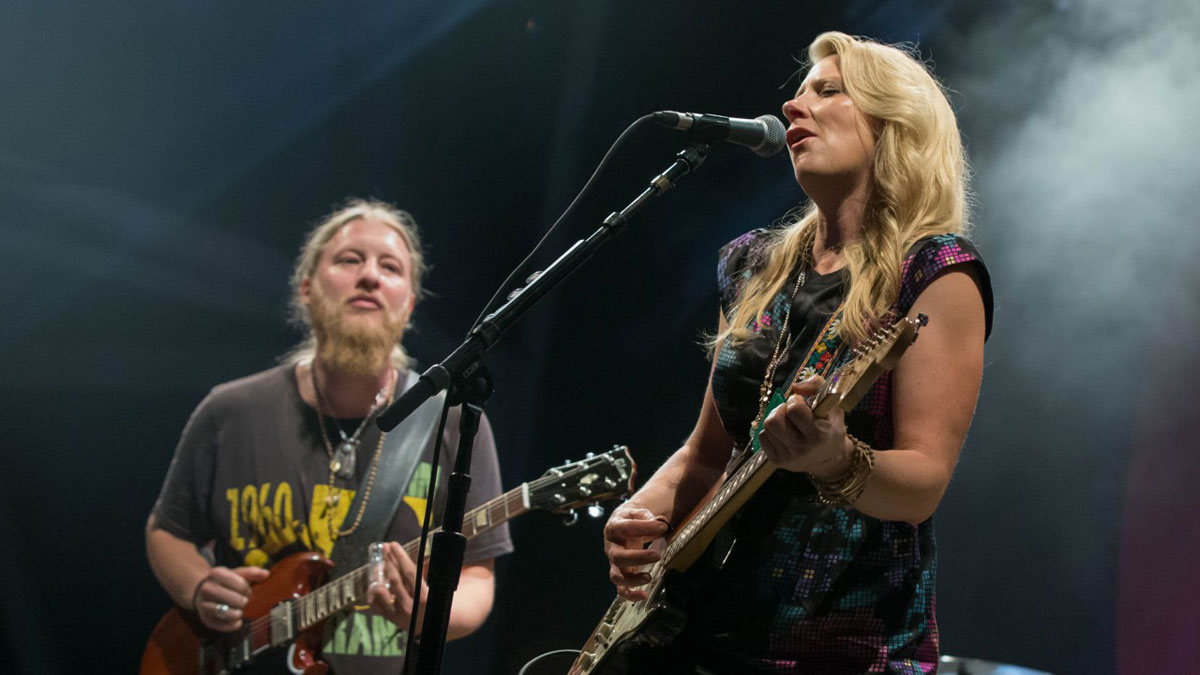
Big is best
“We travel with a full 11-piece band. It’s a powerful sound. There’s a lot of talent onstage, and a lot of different places for the inspiration to come from. There’s nothing like it. I’ve been part of a lot of groups, and when this band is firing on all cylinders, it’s really hard to beat.
"Susan is a damn good guitar player. She can get it done. Especially when it comes to that Johnny ‘Guitar’ Watson or Magic Sam-style"
“I get addicted to that. Luckily, the way that me and Susan think, we’ve never been driven by career-oriented or financial goals. We’re stubborn enough to just put a band together that we want to play with. The accountants and managers, they often wonder why we have so many people on the road. It’s a labour of love, y’know?”
Keep it in the family
“Susan is a damn good guitar player. She can get it done. Especially when it comes to that Johnny ‘Guitar’ Watson or Magic Sam-style, that real stinging thing. I really don’t know too many people that can do it the way she does.
“I just saw Jimmie Vaughan at the thing for Clapton’s 70th birthday, and it hit me that he must have had a big influence on her, because it’s coming from a similar place. He’s one of the few people that has that same thing where it’s really angular and muscular, and it feels like it’s on the edge of destruction, but it always makes it. There’s something heroic about that sound. It keeps you on the edge of your seat.”
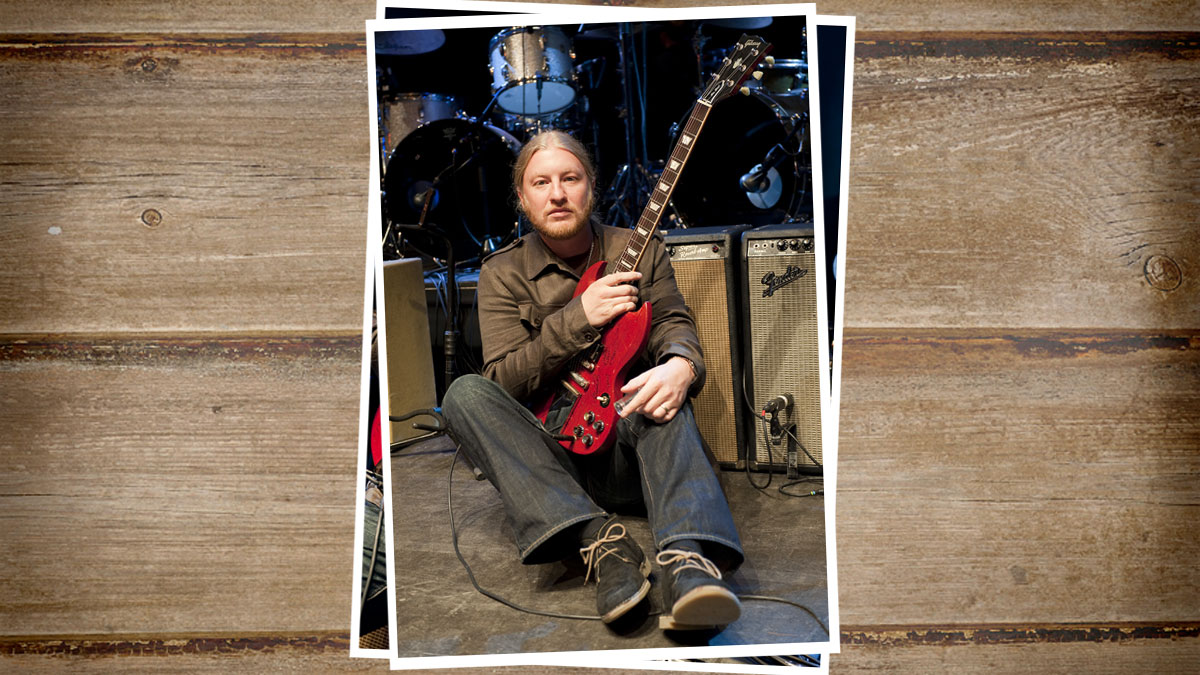
Speed kills
“I feel like as you get better, you pare it down a bit. Once you’ve played with guys like BB or Eric, who are such masters, you learn how to breathe. That’s what I want to hear.
“I mean, I want to hear the edge of that, where you’re pushing and trying things. But then there are times when it needs to breathe - and I feel like that’s the part that’s lost with a lot of the new generation of musicians and blues players.
"It hit me. It’s in your hands. Good guitars, good amps - all that stuff helps. But it doesn’t make a player"
“It’s like, ‘You know what, I don’t want to be in a conversation with anyone that’s talking that much - and I certainly don’t want to listen to it. I want it to feel like we’re in this thing together!’”
It’s all under the fingernails
“When you pick up an instrument, your personality comes through. Some people, it doesn’t matter what instrument they pick up. I remember seeing early footage of Hubert Sumlin with Howlin’ Wolf, and he’d be playing these really strange amplifiers and guitars, and I always used to think you could only get that awesome sound with that weird combo.
“But then, years later, we were in this dressing room together at some festival, and there was this brand-new Fender amp and this Gibson with a tag on it that was off the shelf. Hubert started playing and it was the exact sound I remembered.
“So it kinda blew that theory out of the water. Then it hit me. It’s in your hands. Good guitars, good amps - all that stuff helps. But it doesn’t make a player.”
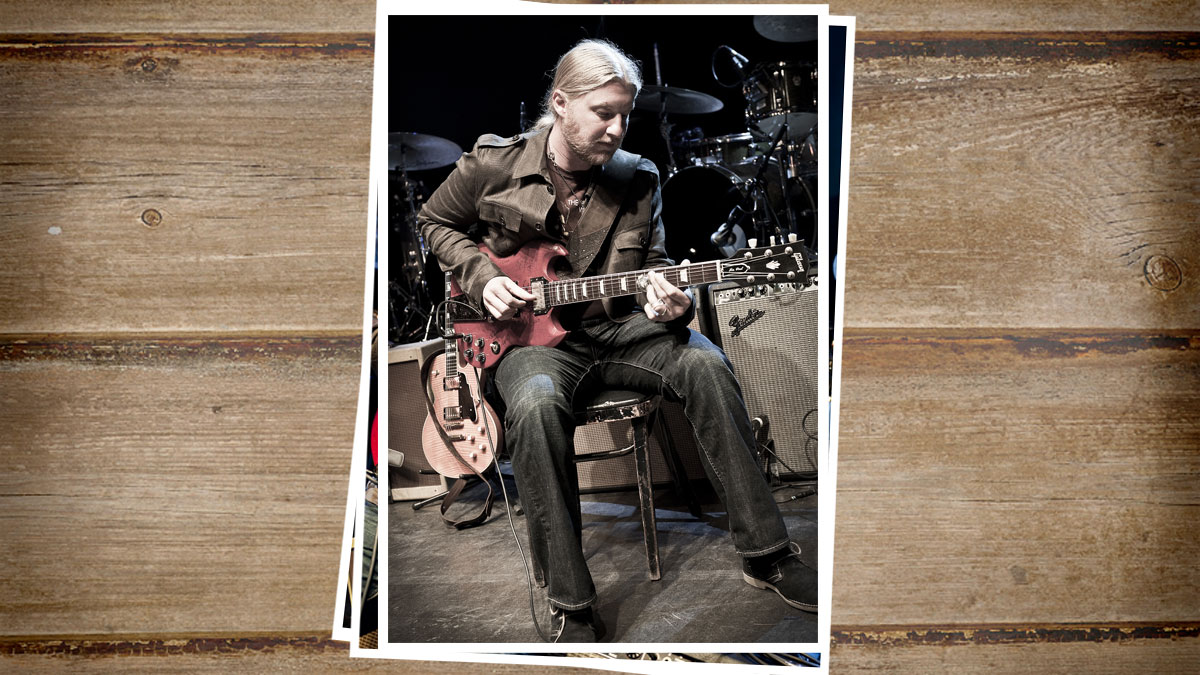
The SG isn't just for metal
“That’s the first image people think of, but for me, it was seeing a picture of Duane Allman playing a Gibson SG that got me interested in them. And then later on, I found out that Johnny Jenkins was playing an SG on all of those early Otis Redding records, where it sounds like a cross between a Stratocaster and a Les Paul.
"It could be scary that I try to never play the same thing twice, but most of my heroes played that way"
“So it’s a great guitar for that sort of sound. Visually, it’s a mean-looking instrument, with the horns on, so it’s easy to think about hard rock and heavy metal, for sure. But I think there are a lot of things you can do with it.”
Walk the tightrope
“You’re always trying to find new things, keep pushing, keep searching. I guess it could be scary that I try to never play the same thing twice, but most of my heroes played that way. You enjoy the tightrope walk. The beauty for us is that it’s not like actual tightrope walking, where if you fall you’re gonna die.
“As long as you’re okay with mild embarrassment from time to time, you’ll get by. And often times, the things that come right after a slip are the most brilliant, because then the musical adrenaline kicks in and you go to your best shit!”
It’s not all about slide
“I go back and forth. There are times when I enjoy regular guitar playing more. Often, I feel like some of my more creative ideas are coming out that way. And then, other times, I go more to the other way, and I feel like I want to play slide guitar.
“And then there’s times when it really is a good balance, where I can kinda go back and forth, even within a solo. That’s when I feel like it’s working the best, when it’s just kind of an afterthought. Y’know, when you’re hearing things and you’re just playing them.”
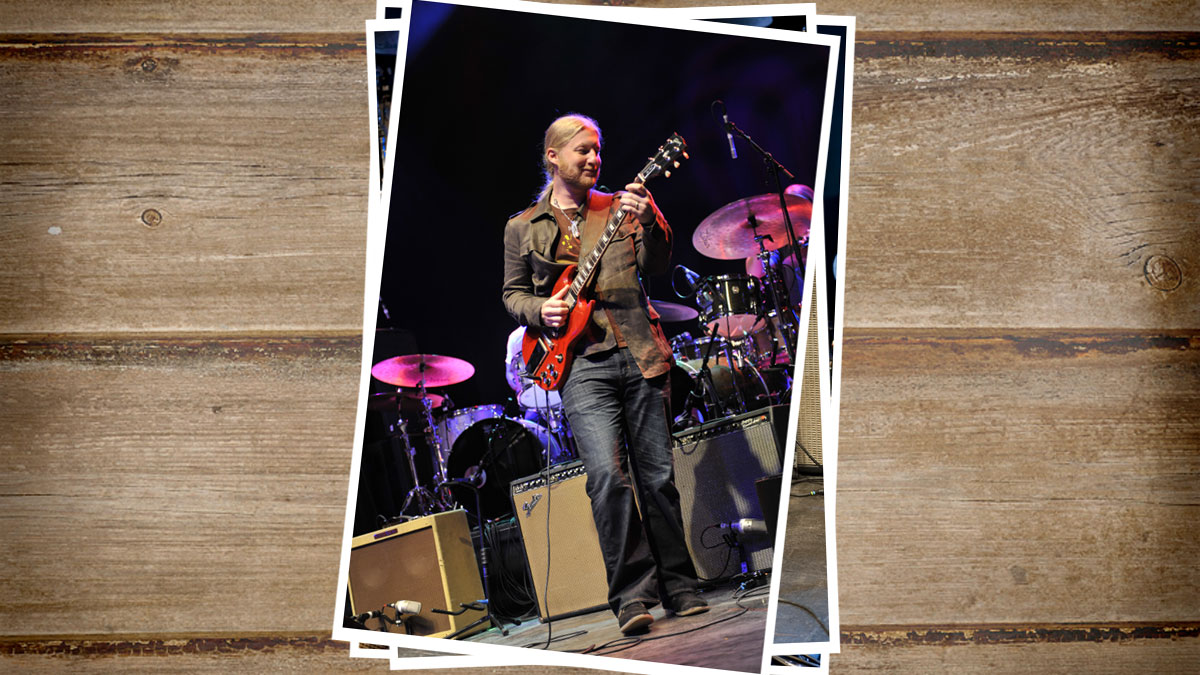
Turn off the autopilot
“This band is different to a lot of other groups. I feel like a lot of musicians try to find a formula.
“You know the buttons that you can push to make a crowd react, the easy hits, the things that work, that are no-brainers. We really try to avoid that. We try to really create moments from night to night, and not rely on a bag of tricks.
"When something is legit and solid, it’s always gonna be there. I still feel like, if it’s real, it’ll last, y’know?"
“If the band is inspired, and real things are happening, then people certainly feel that. It’s a different feeling. You know when you see an artist and it’s happening for them, too. The music levitates, the crowd feels it, and those are the things that you remember for years and years.”
Guitar is the future
“If you become a master of your craft, and you keep working at it, and you take it to levels that people haven’t, there are always gonna be people listening. I feel like so much of the things that are going on now, it doesn’t matter how well they’re doing now, how many tickets they can draw - I think a lot of that stuff is just gonna fall by the wayside.
“Because it doesn’t hold water. There’s gaping holes in it, and no matter how much you pour into it, it will always drain out. But when something is legit and solid, it’s always gonna be there. I still feel like, if it’s real, it’ll last, y’know?”
The Tedeschi Trucks Band perform at the Prudential BluesFest at The O2 in London from 7 to 8 November

